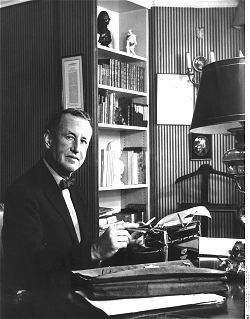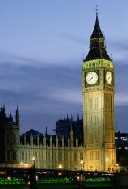|
Casino Royale Book Review

Casino Royale is the first James Bond novel and was originally
published in 1953. Post war readers were thrilled by the Fleming mix of
colour, escapism, sadism, sex and food and both the author and his
creation went on to become world famous.
The plot of Ian Fleming's Casino Royale involves a Soviet agent named
Le Chiffre. Le Chiffre is connected to SMERSH - a ruthless organisation
similar to the KGB. Le Chiffre has taken control of a number of
brothels in the west with SMERSH money. He knows that he is a dead man
unless he recovers the money he has used funding his bad habits and
therefore comes up with a plan. He will use his considerable gambling
abilities to make up his losses at baccarat in the casino of
Royale-les-Eaux. The British cannot take out Le Chiffre for fear that
his death will be used for propaganda purposes agaisnt them. Instead
they decide to use MI6 agent James Bond. Bond is the best gambler in
the service and is assigned the task of playing agaisnt Le Chiffre at
the gaming tables. If Bond beats him then Le Chiffre will be ruined and
quickly eliminated by SMERSH. Covert Soviet influence in France will be
greatly damaged...
The first Bond novel is more restrained than many of the books that
followed. James Bond himself comes across as a slightly jaded but
urbane cold war warrior. He isn't a one-man army engaging in
free-running chases through construction sites here. He is a 'blunt
instrument' used by the British government to protect their interests.
A slightly mysterious and sophisticated loner with the darkly handsome
looks of a film star, Bond is a man of many vices who has cultivated
expensive tastes through his job and missions. 'An expense account
snob' as he was described once by someone who escapes me. Despite the
urbane charm he can project in the appropriate circumstances, Bond is
also a trained assassin - we learn that he became a Double-O with two
kills on missions during WW2;
"I've got the corpses of a Japanese cipher expert in New York and a
Norwegian double agent in Stockholm to thank for being a Double-O.
Probably quite decent people. They just got caught up in the gale of
the world"
Apart from his baccarat skills, Bond is also chosen for the mission because he is notorious for being 'tough'.
Casino Royale doesn't have a huge amount of action but it unfolds in an
entertaining manner. Early on there are attempts on Bond's life and
although the events and different characters can be a litle confusing
at first the book captures the paranoid feeling of the cold war where
everyone is looking over their shoulder and making sure their room
isn't bugged. While his prose could be simple at times, Fleming was
known for being a very descriptive writer - especially when describing
things he loved like gambling and food. While this sometimes veered a
bit too close to 'padding' in some of his books it was also a strength
of his writing and one of the reasons why his books were so loved. If
James Bond sits down to dinner Fleming will tell you exactly what he's
having with the relish of a Restaurant critic. This fastdious approach
to food is something I'v enjoyed about the books. "You must forgive
me," Bond says to Vesper. "I take a ridiculous pleasure in what I eat
and drink." Bond's attitude to life is linked to the knowledge that in
his job every single day might be his last. Even if you don't know your
Taittinger 45 from your Blanc de Blance Brut 43 it's fun to enter this
world.
In the book Bond is teamed with another British agent named Vesper
Lynd, although he isn't very happy at first to be working with a woman
("Do they think this is a bloody picnic?"). Lynd, the original Bond
girl, sets the template for many of the women that Fleming would write
about in his books - gamine, beautiful and slightly messed up. Felix
Leiter, an American working for NATO, is also on hand to help Bond.
Leiter is used to illustrate the Atlantic alliance and the ties between
Britain and the US.
Although a short book with a simple plot, Casino Royale is structured
around some vivid set-pieces that provide the twists and suspense. The
baccarat showdown is relished by Fleming and his knowledge of the
subject leads to some very descriptive and absorbing passages. The high
stakes, desperation, risks and euphoria of a winning hand is skillfully
conveyed. I won't give away the last sections of the book but Bond is
put through the mill as the mission becomes more complex and dangerous.
I think Casino Royale grips the reader more as it progresses.
Fleming's Bond took his share of good hidings and, a bit like Indiana
Jones, it was part of the fun of the character. We knew he would take
his punishment and live to fight another day. The Bond of Fleming's
Casino Royale reminds you of Phillip Marlowe. A flawed man who needs a
few whiskies to get him through the day and is constantly being beaten
up! Like Marlowe, the Bond of the books is required to do more
old-fashioned detective work than the cinematic Bond. The romantic
aspect to the novel is used well to imbue James Bond with an
introspective quality. He is often gazing out to sea or questioning his
loyalties and life. This makes the character more human and enigmatic
than his cinematic version.
The fun of Casino Royale and Ian Fleming's work in general is in being
taken back to another era and having it lovingly described. The decor
of hotels and casinos, the cars, food, clothes and style. Everyone
smokes constantly and drinks like a fish, meals are lavish. James Bond
is a fantasy window into another world that is fun to escape into now
and again, although Fleming's work would not pass too many PC tests
today.
Although the most restrained and human of the Bond novels, Casino
Royale serves as a stylish introduction to perhaps the most enduring
hero of them all and remains an entertaining and important book for
anyone that loves popular culture.
- Jake
c
2008
Alternative 007
|

|


